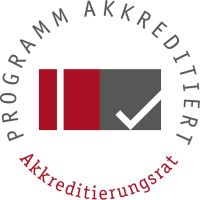Subject of accreditation
The subject of programme accreditation are Bachelor's and Master's programmes offered by state or state-recognised higher education institutions in Germany. If a study programme has successfully undergone an accreditation procedure, it receives a limited accreditation with or without conditions and bears the Accreditation Council’s seal of quality for the period of its accreditation. If study programmes have a high affinity on subject level, accreditation can also be carried out as part of a clustered procedure (cluster accreditation); nevertheless, the accreditation decision always refers to the seal of programme accreditation of individual study programmes.
Evaluation
The accreditation procedure is a multi-stage process based on the principle of peer review. If a higher education institution commissions an agency approved by the Accreditation Council to carry out an assessment procedure, the agency in question appoints a review panel whose composition reflects both the subject matter and the specific profile of the study programme. The review panel includes representatives of all relevant interest groups, namely
- at least two subject-related professors,
- one subject-related representative with professional experience,
- one subject-related student
When appointing the review panel, the agency is bound by the procedure developed by the German Rectors' Conference. The professors have the majority of votes in the panel.
Fulfilment of the formal criteria from part 2 of the specimen decree is assessed by the agency. The agency documents the result in a formal report, which is made available to the experts.
The academic assessment of the study programme by the review panel is based on the criteria laid down in part 3 of the specimen decree and, in addition to the analysis of the application documents, usually includes a site visit at the higher education institution. In the course of this site visit, the review panel holds talks with representatives of the higher education institution. Subsequently, the experts prepare an experts’ report with a recommendation for a decision on the accreditation of the study programme.
The formal report and the experts’ report (= accreditation report) are to be written in the format specified by the Accreditation Council.
Decision
The Accreditation Council decides on the accreditation of the study programme at the request of the higher education institution. The basis for the decision on the formal criteria is the formal report of the agency, the basis for the decision on the academic criteria is the experts’ report of the review panel.
If the Accreditation Council intends to deviate significantly from the experts' recommendation, the higher education institution is given the opportunity to comment before the Accreditation Council's decision.
In case of a positive accreditation decision, the study programme will bear the Accreditation Council’s quality seal. After completion of the procedure, the Accreditation Council publishes its decision and the expert report including the names of the experts in the central database of accredited study programmes and system-accredited universities. Accreditation is granted for a limited period of eight years.